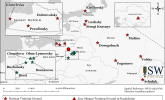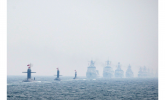Turkey in Review: September 27-October 12
October 15, 2021 - Ezgi YaziciTurkey’s Balancing Act between Russia and the United States Falters
By Ezgi Yazici
Turkey’s Balancing Act between Russia and the United States Falters
By Ezgi Yazici
Serbian President Alexander Vucic exploited Kosovo’s implementation of a new border crossing law to frame Kosovo Serbs as victims of ethnic discrimination and provoke a regional crisis on September 20, 2021. Kosovo’s government-imposed license plate regulations requiring Serbian cars entering Kosovo to receive temporary Kosovar license plates – a reciprocal measure of how Serbian authorities have regulated Kosovar cars entering Serbia for several years – on September 20. Kosovo ethnic Serbs blocked two border crossings with Serbia in northern Kosovo to protest this policy on September 20. Kosovar riot police deployed to the roadblocks and reportedly used tear gas against Serb protesters on September 20. Vucic decried Kosovar police uses of force against ethnic Serb protesters, claiming that Serbs in Kosovo suffered a “brutal attack.” Likely ethnic Serb protesters committed arson against a Kosovo vehicle registration office that did not cause casualties on September 25.

Russia’s ruling United Russia Party retained its majority in highly falsified parliamentary elections. The State Duma, the lower house of Russia’s parliament, conducted its five-year elections from September 17-19. The Kremlin-run Central Elections Commission (CEC) reported in preliminary results on September 21 that the United Russia party won 49.8 percent of the vote, securing 324 out of 450 seats, and announced a turnout of 52 percent.[1] United Russia held 343 seats before the election.

The recent Iranian proxy drone attack on Erbil International Airport was likely a stand-alone event and likely does not indicate the immediate resumption of large-scale Iranian proxy attacks on US facilities in Iraq. Iranian proxy militants launched two drones targeting what Iran assessed to be an Israeli intelligence asset at Erbil International Airport in Iraqi Kurdistan on September 11, 2021, possibly triggering an Israeli retaliatory strike on a proxy convoy in Abu Kamal, Syria, on September 14. Iran may have approved this attack after US and Israeli political and military leaders met in recent weeks to discuss their strategies for addressing the threat Iran poses to US, Israeli, and regional security. The 20th anniversary of the 9/11 New York terrorist attacks may have influenced the timing of the attack. Iran will likely maintain its ban on large-scale attacks on US facilities in Iraq until after Iraq’s October 10 elections and possibly until the end of 2021 unless the Iran-Israel escalation cycle spills further into Iraq.

Russia and Belarus conducted a joint strategic exercise in September 2021 that provides essential insight into the evolving capabilities of the Russian and Belarusian militaries. The exercise advanced the Kremlin's ongoing campaign to cement its control of the Belarusian military.

Turkey is evaluating the changing security environment and the emerging Taliban government to strike a minimal-risk balance between Ankara’s ambitions and constraints. Turkey evacuated its troops from Afghanistan on August 27 after months-long negotiations with US and Taliban representatives to retain a security role in the country after NATO’s departure. However, Turkish officials are still signaling their intent to adopt a political and security role in Afghanistan and to become the Taliban’s primary interlocutor with the West.The Turkish government will likely remain committed to playing a stabilizing role in Afghanistan—primarily through non-military channels—to promote its international standing as an influential regional power.
The Kremlin deployed S-300 air defense systems to Belarus in late August 2021, advancing a longstanding Kremlin campaign to establish a permanent Russian military presence in Belarus postured against NATO’s eastern flank. This deployment increases Russian military capabilities to contest strategic airspace between the Baltic states and mainland Europe. The Kremlin seeks to degrade NATO's ability to defend the Baltics. Russian military personnel, as opposed to Belarusian personnel, will likely operate these S-300 systems. Elements of Russia’s 210th Air Defense Regiment arrived in Grodno, on the Belarusian border with Lithuania, on August 28. The Belarusian Ministry of Defense (MoD) stated this deployment supports the permanent joint Russian-Belarusian air defense and air combat training center in Grodno that Moscow and Minsk agreed to create in March 2021. The Belarusian MoD did not connect this deployment to preparations for Russia’s annual strategic exercise Zapad-2021, which will occur in Belarus and western Russia from September 10 to 16. ISW first warned about the threat of Russian air defense deployments to Belarus in August 2020.

Through wargaming, the PLA aspires to achieve an edge in military competition, seeking to “design” the dynamics of and develop capabilities for future warfare.

The Taliban’s swift seizure of Kabul has altered key regional states’ calculus toward Afghanistan. Russia, China, Iran, and Turkey are weighing how to take advantage of the United States’ hurried withdrawal while mitigating the new terrorist threats and refugee waves from Afghanistan that will likely follow. All four states will likely recognize the Taliban as the official government of Afghanistan in the coming months. The Taliban’s victory also presents an opportunity for al Qaeda and other Salafi-jihadi groups to expand their havens in Afghanistan and intensify ongoing efforts to inspire terror attacks in the West capitalizing on the 20th anniversary of the September 11th attacks.
Kremlin messaging on Afghanistan since August 15 has balanced praise for the Taliban’s supposedly “peaceful” takeover of Kabul with cautious rhetoric about officially recognizing the Taliban, which is still formally designated as a terrorist organization in Russia. Zamir Kabulov, the Kremlin’s special representative for Afghanistan, stated on August 16 that the Kremlin “prepared the ground ahead of time” to work with “the new government of Afghanistan.” Kabulov said that Russia has retained its embassy in Kabul with security cooperation from the Taliban and praised the Taliban for taking over security in the capital “absolutely peacefully.”